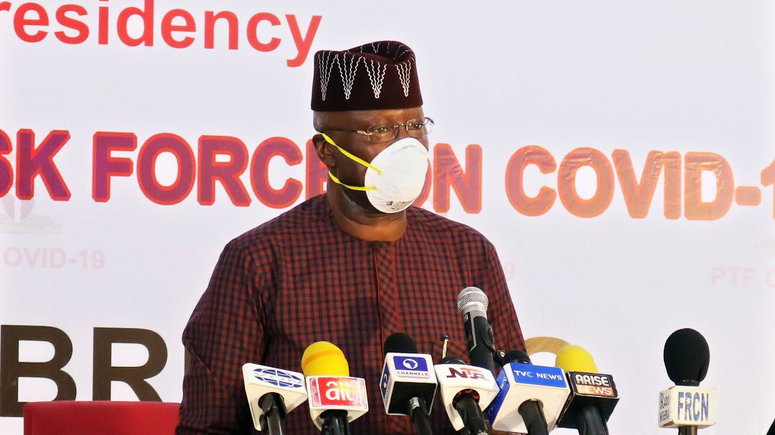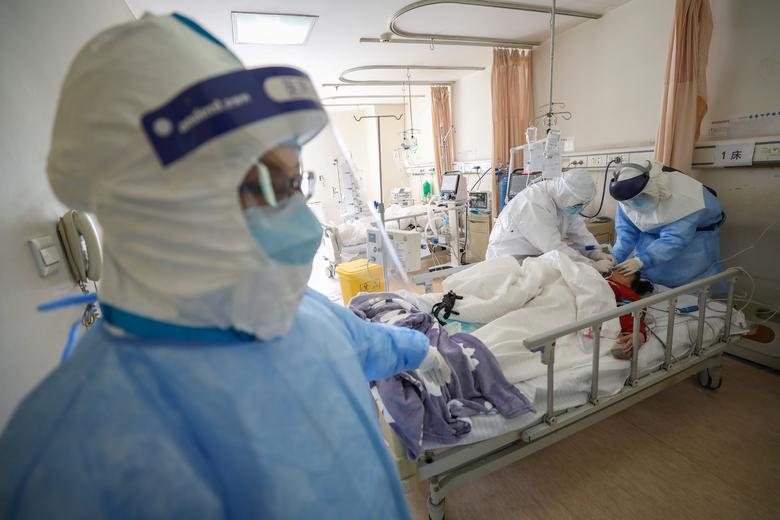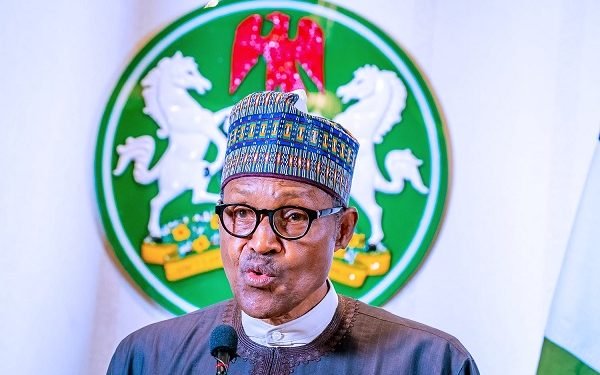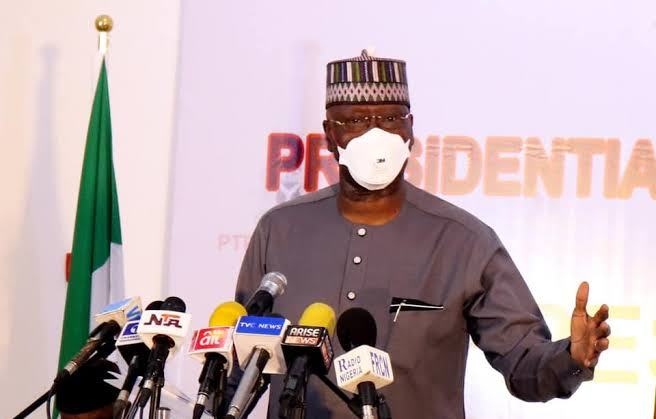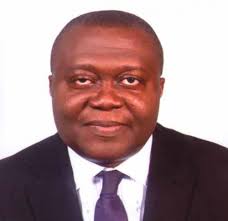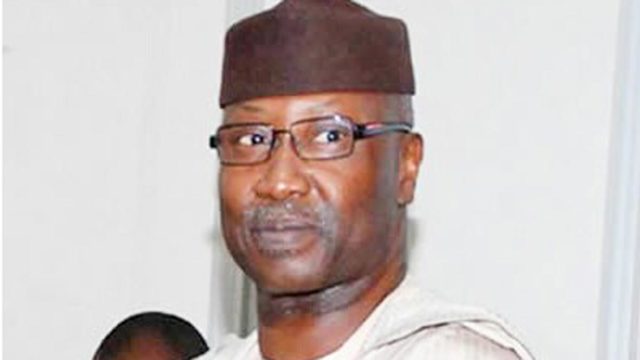The Presidential Task Force on COVID-19 (PTFCOVID19) has released updated implementation guidelines for the containment of COVID-19 in Nigeria.
TheNewsGuru.com (TNG) reports the updated guidelines signed by Mr Boss Mustapha, Secretary to the Government of the Federation/ Chairman, PTFCOVID19 cover aspects of general movement, reopening of airports, markets, intrastate travel and interstate travels.
The updated guidelines also cover industry and labour, schools, supermarkets, funerals, churches, mosques, hotels, restaurants and eateries, bars, gyms, cinemas and night clubs, recreational parks/communal sports, and hospital visits, and more
UPDATED IMPLEMENTATION GUIDELINES FOR CONTAINMENT OF COVID-19
In view of the progress made with Nigeria’s COVID-19 pandemic, there is no longer a strong need for a generalised lockdown as was the case during the initial stages of the response.
The Federal Government has decided that the next phase of the response (Phase 2) will involve a cautious but progressive easing of the lockdown across the Federation, with a stronger focus on high burdened local government areas (LGAs) within identified States of the Federation.
As the State Governments start taking a greater role in developing restrictive guidelines at the LGA level, the Federal Government is approving the lifting of the current lockdown in Kano State while allowing a minimum set of safety conditions to apply nationwide to ensure that the gains made thus far are consolidated, so that the country is positioned to effectively overcome the pandemic going forward.
Further to the pronouncement of the Chairman of the Presidential Task Force (PTF) and Secretary to the Government of the Federation, Mr. Boss Mustapha at the Daily PTF Press Briefing of Monday 1st June 2020, the following implementation guidelines on measures to control COVID-19 pandemic are hereby issued for:
- General Information to the Public;
- Guidance to States and Security Agencies; and
- Description of the types of activities allowed under Phase 2 (2nd-29th June 2020)
SECTION I: GENERAL INFORMATION ON NEW COVID-19 MEASURES
2. The next phase of the nation’s COVID-19 response will involve the lifting of the full lockdown in Kano while providing a nationwide set of minimum safety guidelines that States can build on to strengthen their local strategies on preventing the transmission of COVID-19 at the community level. The goal of phase 2 over the next 4 weeks is to balance public health with protecting livelihoods and allow the full restoration of economic activities across the country. In this regard, all public and private sector institutions must start putting in place the arrangements required for full compliance with containment measures and safety advisories as provided by the PTF.
3. Effective from Tuesday 2nd June 2020, the easing of the lockdown will be characterised by the following:
- The mandatory use of non-medical face mask/covering for all persons while in public spaces. Latex hand gloves should not be worn except for specific medical purposes;
- The mandatory provision of handwashing facilities/sanitizers in all public spaces;
- All interstate travel by individuals remain prohibited except for essential travels & the movement of goods and services. All restrictions on the free movement of goods and services within and between States is now removed;
- The nationwide curfew remains in place, but the timing has been changed to 10 pm to 4 am.
The purpose of the curfew is to limit social interactions and reduce the risk of transmission of COVID-19. Persons that are on essential duty, including but not limited to those involved in the provision of healthcare services, media services and critical infrastructure are exempted from the curfew;
- Mass gathering of more than 20 people outside of a workplace is prohibited;
- There will be controlled access to markets and locations of economic activities with local authorities providing guidance on opening times;
- The financial sector shall be fully opened with banks operating normal working hours, five days a week;
- The manufacturing industry shall fully resume activities with phased opening of the informal sector;
- Mandatory temperature checks will be conducted in public spaces;
- Physical distancing of 2 metres must be maintained between people in workplaces and other public spaces; places of worship, offices and commercial premises must create floor markings to guide physical spacing;
- Gradual opening of air (domestic) and sea borders with safety advisories in place. International land borders shall remain closed;
- Restricted opening of places of worship based on state government protocols and with strict guidelines on physical distancing and other non-pharmaceutical interventions; and
- Mandatory supervised isolation of person(s) arriving from outside the country for at least 14 days will continue until a new protocol comes into place.
General Rules and Regulations
- Anyone who presents with a temperature of above 380C will be mandated to return home and call NCDC for evaluation;
- Anyone without a face mask/covering will be asked to return home and will be prosecuted;
- Anyone violating the curfew in a non-emergency situation will be prosecuted;
- Anyone attending a gathering of more than 20 people outside a workplace will be prosecuted;
- Institutions that fail to comply with these protocols and guidelines will be prosecuted; and
- Any member of the public who violates the ban on inter-State movement as outlined in this guideline will be prosecuted;
- This extension will continue to be characterised by the creation of mobile courts for immediate prosecution of offenders.
SECTION II: PROTOCOLS FOR CONTAINMENT OF COVID-19
GENERAL MOVEMENT ASPECT RECOMMENDATION
Curfew now to operate 10 pm – 4 am nationwide
General Movement
- May go out for work, to buy necessary foods and for exercise
- Movement between LGAs (except metropolitan areas) is strongly discouraged unless for critical reasons such as healthcare and work, especially as it applies to high burden LGAs
- Avoid unnecessary contact with people, preferably stay at home
- Hawking and street trading remains prohibited
- Mandatory use of face masks/coverings in public
Air Transport
- The Aviation industry to commence preparation for the resumption of domestic operations from TENTATIVE DATE OF 21st June 2020
- Airlines to ensure physical distancing by reducing passenger capacity on flights
- Ensure provision of sanitisers and appropriate PPEs to all workers (such as face masks, gloves etc.)
- Carry out temperature checks at point of entry and departure
- Ensure cargo and logistics areas are clean and conduct strict compliance when moving items
- Carry out effective tracking of travellers to ensure contact tracing if necessary
- Only travellers and airport staff to be allowed into airport facilities
Inter-State Travel
- Movement across state borders is still banned
- Allow movement of all goods and services including but not limited to agricultural products; Petroleum products transport; Security Services;
Essential Personnel
Allow essential travel, ensuring the following:
- Provision of sanitisers and appropriate PPEs to all workers (such as face masks, gloves etc.)
- Reduce to 50% of usual occupancy for buses and driver plus 3 passengers for Taxis
- Non-medical face mask for drivers and staff
- Temperature checks at point of entry and departure
- Handwashing facilities at bus parks, along with physical distancing
Intra-State Travel
- Ensure provision of sanitisers and appropriate PPEs to all workers (such as face masks, gloves etc.)
- Reduce to 50% of usual occupancy for buses and driver plus 3 passengers for taxis
- Where possible, carry out temperature checks at point of entry and departure
- Provide handwashing facilities at bus parks, along with physical distancing
- Restrict movement in high burden LGAs to essential travel only
INDUSTRY & LABOUR ASPECT RECOMMENDATION
Banks and other Financial Institutions
- Banks to operate normal working hours
- Maintain normal working hours based on curfew arrangements apart from government offices
- Offices to maintain working at 75% capacity, while ensuring 2m physical distancing
- Ensure provision of sanitisers and appropriate PPEs to all workers
- Limit number of customers to allow physical distancing
- Limit workers to 75% or less to allow physical distancing
- Banking operations should prioritise the elderly, people living with disabilities and customers who do not have access to internet services
- Mandatory use of non-medical face mask
- Encourage online banking and provide services online
- Temperature checks
- Ensure all ATMs are functional and cleaned daily
Government offices/ other corporate offices
- To work from 9 am – 2 pm from Monday -Friday
- Ensure provision of sanitisers and appropriate PPEs to all workers
- Use non-medical face mask
- Encourage work at home policy for civil/public servants below GL14.
- Temperature checks on arrival
Manufacturing Industries
- Ensure provision of sanitisers and appropriate PPEs to all workers
- Limit number of workers to allow physical distancing
- Use non-medical face mask
- Conduct temperature checks
Personalised Services
- Mechanics, artisans, haïr salons, etc. who own their workshop or workstations and can clearly adhere to non-pharmaceutical interventions are permitted to operate
- Ensure wearing of a face mask when selling goods or providing services
- Ensure provision of sanitisers and appropriate PPEs to all workers
- Limit number of workers and customers to allow physical distancing
- State and Local Government Authorities shall work with the Unions/Associations to monitor and ensure compliance
Supermarkets
- Ensure provision of sanitiser to all customers
- Limit number of customers to allow physical distancing
- Use non-medical face mask
- Temperature checks
- Limit capacity to ensure appropriate physical distancing
Markets
- Allocate day and time for opening of shops based on arrangements by local authorities
- Observe all mandatory non-pharmaceutical interventions
- Observe physical distancing
- Ensure supply of running water and soap/alcohol sanitizer
- Temperature checks at all entrances and by shop/stall owners
- Use of face masks always
- Maintenance of environmental hygiene in the market
- Ensure presence of health officers at the abattoirs
Hotels, Restaurants and Eateries
- Hotels may re-open but must observe all mandatory non-pharmaceutical interventions
- Restaurants in hotels are to only cater for residents
- Restaurants (other than those in hotels) to remain closed for eat-ins
- Eateries to prioritise and continue practicing the take-away system with strict cleanliness
Bars, Gyms, Cinemas and Night Clubs
- Closed until further evaluation
Agriculture
- Farmers to adhere to physical distancing on site
- Ensure provision of cleaning stations at all points of entry
- Observe all mandatory non-pharmaceutical interventions
- Observe physical distancing
- Ensure supply of running water and soap/alcohol sanitizer
- Temperature checks
- Use of face masks always
COMMUNITY ACTIVITIES ASPECT RECOMMENDATION
Day-care and Primary Schools
- All schools to remain closed till further evaluation.
- Schools are encouraged to continue with e-learning and visual teaching.
- Arrangements to be made for exiting (graduating) students to undertake exams in the next phase of ease of lockdown.
Secondary and Tertiary Institutions
- All schools to remain closed till further evaluation.
- Preparation should be made for graduating classes to finish exams with appropriate distancing measures by next phase of ease of lockdown.
- Schools are encouraged to continue with e-learning and visual teaching.
Churches, Mosques/ Places of Worship
- Restricted opening subject to the guidelines issued by the PTF and protocols agreed by respective state governments
- Observe all mandatory non-pharmaceutical interventions
- Observe physical distancing
- Ensure supply of running water and soap/alcohol sanitizer
- Temperature checks at all entrances
- Use of face masks always
- Maintenance of environmental hygiene.
- See additional guidance in Section III.
Recreational Parks/ Communal Sports/ Hospital visits
- Closed until further evaluation
- Limited to immediate family members
Funerals
- Limited to 20 people including close family members
- All attendees must clean hands before and after attendance
- Physical distancing must be adhered to for all attendees
SECTION III: GUIDANCE FOR THE CONTAINMENT OF COVID-19 IN PLACES OF WORSHIP
In view of the widespread community transmission of COVID-19 in Nigeria, it is important that places of worship operate in a safe manner to ensure the protection of public health, avoid outbreaks and safeguard the health of vulnerable members of the population.
To this end, the following guidelines have been developed as a minimum set of standards that have to be complied with for places of worship to safely operate nationwide. They have been developed by the PTF in liaison with leadership of the religious communities in the country and should be used by State governments as the baseline for permitting the use of these facilities.
It is important to note that due to the nature of religious gatherings, places of worship are particularly recognised to have a major potential for spreading COVID-19 among worshippers, as demonstrated by several outbreaks globally linked to religious gatherings.
Therefore, places of worship that are unable to comply with these measures should not be allowed to operate and may face prosecution.
A. All places of worship must sign up to full compliance with all aspects of non- pharmaceutical interventions required to protect the public from COVID-19, including but not limited to:
- Ensuring the supply of running water and soap/alcohol sanitisers at entry and exit points and in all high-contact locations including bathrooms;
- Worshippers must sanitise their hands before entry;
- Provision of temperature checks before entry;
- Mandatory use of face masks;
- Strongly discourage all close contact including shaking hands, hugging, kissing, handing out of materials and sharing of worship implements including prayer mats, musical organs, microphones etc;
- Limit the capacity of the facility to allow for physical distancing of at least 2m between persons. Consider the use of floor/surface markings to guide distancing. Encourage people from same household to stay together;
- State governments to provide guidance on local arrangements for limiting capacity of places of worship based on strict maintenance of physical distancing rules;
- Volunteers should be limited to exact numbers needed and none should have an underlying medical condition or be above the age of 55 years; and
- The leadership of the mosques/churches will be responsible for full compliance with these rules.
B. Limit congregational contact times, with places of worship only opening for regular church and mosque services;
- Churches to open from 5am and close by 8pm;
- For churches, each service shall be for a maximum of 1 hour with an interval of 30 mins in between services to allow time for disinfection;
- Mosques, to open 15 mins before Adhan and close 10 mins after prayers for the five prayers. Waiting period between Adhan and Iqamah should not be more than 10 minutes. Prayers to be shortened to reduce duration of contact between congregations;
- For Friday prayers, mosques are to open 20 minutes before prayers and close 20 minutes after prayers. Total time for Friday prayers including sermons should not exceed 1 hour;
- Islamiyah schools, All-Night Vigil, Sunday School and children activities are to remain suspended. For mosques, only the five daily prayers and Friday prayer services are allowed;
- Mass gatherings that make compliance with physical distancing impossible are not allowed. Stagger prayer sessions if necessary, to encourage greater opportunity for physical distancing. Encourage worshippers to sign up for preferred service time. Make virtual worship option available;
- Plan for separate entry and exit points and measures to direct the flow of people to avoid crowding and breach of physical distancing rules;
- There should be no social gatherings either before or after worship; and
- Business outlets within the church or mosque premises should remain closed.
C. Advise vulnerable individuals such as those aged 55 years and above, those with impaired immune systems (e.g. HIV, cancer treatment) and underlying co-morbidities such as diabetes and heart disease to stay at home and consider remote participation or non-contact attendance e.g. drive-in services.
D. Improve environmental hygiene and avoid surface contamination;
- Places of worship should preferably be free of carpets to allow easy and regular disinfection of floors and furniture;
- Keep all windows open during services and preferably use non-enclosed spaces/open air services as much as possible;
- Frequently clean and disinfect high-touch surfaces, high traffic areas, common areas, and bathrooms; and
- Use dilute bleach (1000ppm) to disinfect all surfaces regularly after removal of visible dirt.
E. Keep infected persons out and reduce the risk of onward transmission;
- Public awareness campaign through effective messaging using conventional media and online outlets and placing of signages/notices at strategic locations. This should address common symptoms, risk of transmission, vulnerability to severe illness, etc;
- Remind worshippers not to attend in person if experiencing symptoms of COVID-19 including fever, cough, shortness of breath or have had close contact with an infected person in the last 14 days;
- Exclude all worshippers noted to have a temperature or are symptomatic on arrival at the place of worship;
- Keep up-to-date record of staffing including contact details and if possible, a full record of attendees at every service to enable contact tracing; and
- Considering the dangers posed by the pandemic, any religious visits to homes by religious clerics should be discouraged.
4. State Governments and Security Agencies are enjoined to ensure effective and strict enforcement of these guidelines while respecting the exemptions approved by the PTF.
5. The level of compliance with these guidelines will continue to be reviewed in due course.
